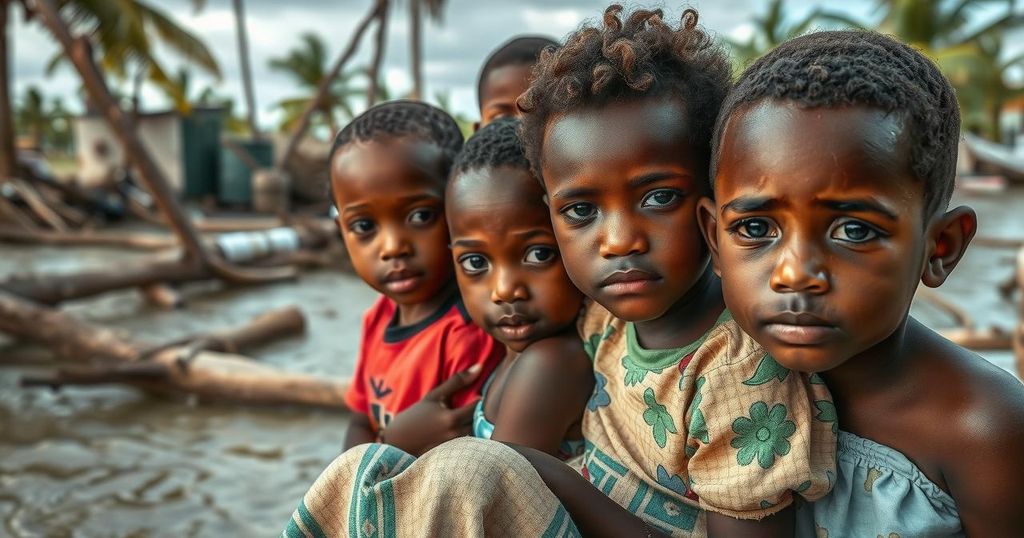Impact of Cyclone Chido on Children and Communities in Mozambique
Tropical Cyclone Chido has devastated northern Mozambique, impacting approximately 90,000 children and displacing many families. Over 35,000 homes are damaged or destroyed, with significant impacts on schools and health facilities. The cyclone has exacerbated existing humanitarian crises in a region already struggling with conflict and disease outbreaks. Urgent humanitarian assistance is being coordinated by UN agencies and local partners amid escalating needs.
Tropical Cyclone Chido recently devastated northern Mozambique, with significant impacts on the population, particularly children. Approximately 90,000 children have been affected as the storm caused severe damage to over 35,000 homes and displaced many families, according to UNICEF reports. The situation has worsened as assessments reveal that at least 174,000 individuals have been affected overall, with critical infrastructure including 186,000 classrooms and 20 health facilities severely compromised.
The cyclone struck near the city of Pemba in Cabo Delgado province, demolishing roofs and disrupting essential services like electricity and communication. Mary Louise Eagleton, UNICEF Representative in Mozambique, highlighted the existing challenges posed by climate change, conflicts, and disease outbreaks that children were facing even prior to the cyclone.
In addition, Cabo Delgado has been mired in conflict for over seven years, displacing more than 1.3 million people, comprising predominantly women and children. The cyclone exacerbated the hardships faced by these vulnerable populations, as many lost their homes and basic necessities again. Significant damages were also reported in Nampula and Niassa provinces, leaving over 25,000 families without power and damaging water supply facilities.
In response to this crisis, the World Health Organization has deployed experts to evaluate health needs in the affected regions, especially amidst a cholera outbreak. The UN refugee agency effectively provided immediate relief to over 2,600 individuals in Pemba, offering blankets, sleeping supplies, and emergency shelter. Preliminary assessments evince that nearly 190,000 individuals urgently require humanitarian assistance.
Despite the scale of the damage, the United Nations is readying further support, with UN Secretary-General António Guterres affirming that emergency assistance is being delivered. However, the initial response faces challenges due to limited supplies, prompting the allocation of $4 million from the UN aid coordination office to facilitate humanitarian efforts. As the World Food Programme anticipates escalating food insecurity in Mozambique, plans to support affected populations are being accelerated.
The impacts of climate change have been acutely felt in Mozambique, rendering it one of the countries most affected globally. The recent Cyclone Chido has compounded pre-existing crises, including conflicts and disease outbreaks, particularly affecting children’s wellbeing. Cabo Delgado province, already deeply afflicted by conflict, faces additional challenges as communities continue to cope with cumulative adversities due to natural disasters alongside ongoing instability. The storm has not only devastated infrastructure but has also exacerbated the humanitarian crisis, necessitating urgent intervention from international agencies.
Tropical Cyclone Chido has inflicted extensive damage in Mozambique, significantly impacting children and vulnerable populations already facing multiple crises. Urgent humanitarian assistance is required as thousands have been displaced and critical infrastructure has been compromised. The international community, particularly the UN and its agencies, is mobilizing support to address the immediate needs of those affected while emphasizing the importance of long-term strategies to combat the ongoing challenges posed by climate change and instability in the region.
Original Source: news.un.org




Post Comment